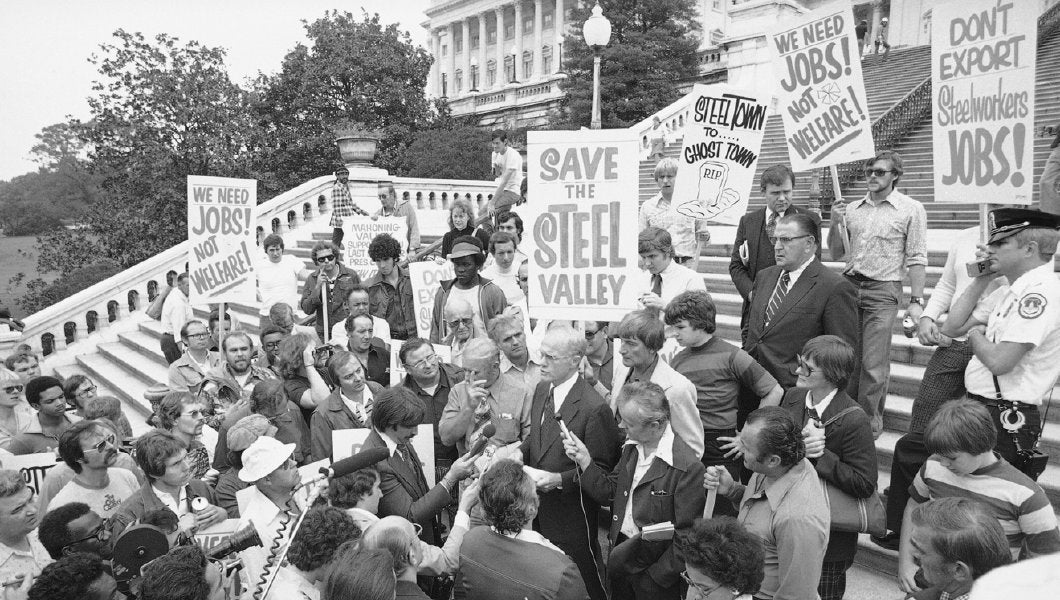WCP: Economic Nationalism and the Half-Life of Deindustrialization
Posted in Visiting Scholars | Tagged Black Monday, Deindustrialization, John Russo, Politics of Resentment, Populism, Rust Belt, Sherry Linkon, Steve Bannon, WCP, White Working Class, Working-Class Perspectives, Youngstown
Four decades ago a major mill in Youngstown shut its doors, setting of a massive process of deindustrialization in the Rust Belt that still stings working people. In this week’s Working-Class Perspective, Sherry Linkon and John Russo trace today’s politics of resentment to the economic changes that disrupted places like Youngstown 40 years ago.
“In a 60 Minutes interview in September, Steven Bannon touted his form of economic nationalism and suggested that Democrats like Senator Sherrod Brown and U.S Representative Tim Ryan understood his economic vision, even if they didn’t agree with him. It was fitting that he name-checked Brown and Ryan, as both come from Northeast Ohio, where the history of deindustrialization began 40 years ago this fall. On September 19th, 1977 — known locally as “Black Monday” — Youngstown Sheet and Tube announced that it was shutting down, kicking off a wave of steel mill closings that would displace more than 40,000 area workers basic steel and steel-related industries.
At the time, some explained deindustrialization as part of the “natural economic order.” Borrowing the term from Joseph Schumpeter, economists and business leaders saw the closings as part of an evolutionary process, a form of “creative destruction” that caused temporary hardships but would lead both capital and labor to more productive activities. While commentators acknowledged that the process was difficult and uncomfortable, they insisted that the ultimate outcome would be economic growth and a higher standard of living.
Eager to validate such promises, local leaders brought in an array of speakers, including Irving Kristol and Michael Novak from the American Enterprise Institute, who gave public lectures at Youngstown State University. Both insisted that the Mahoning Valley would prosper over time as new industries took root and workers retrained for new jobs. It was all part of what Novak called The Spirit of Democratic Capitalism.
But as time passed, the Mahoning Valley continued to decline economically and to lose population. Journalists and scholars stopped asking “when will Youngstown recover?” and started trying to explain what was wrong with this community. Some blamed the region’s decline on political corruption, union contracts that gave workers too much, or the out-of-date skills of the local workforce. By the 1990s, the idealism of creative destruction had been replaced by the politics of resentment, perhaps most clearly represented by Congressman James Traficant, the first modern politician who voiced a version of economic nationalism and has sometimes been compared with Donald Trump.
The politics of resentment were also fueled by a parade of presidential candidates, each promising to address the problems caused by economic restructuring, and each failing to do so. The most infamous of those was Bill Clinton, whose support of NAFTA, the war on drugs, and welfare reform still generates resentment from voters in this area. As Hillary Clinton learned last year, deindustrialized communities have long memories.
In places like Youngstown, many people still remember what life was like when employment was high, jobs paid well, workers were protected by strong unions, and industrial labor provided a source of pride – not only because it produced tangible goods but also because it was recognized as challenging, dangerous, and important. The memory of what it felt like to transform raw ore into steel pipes and to be part of the connected, prosperous community that work generated still haunts the children and grandchildren of those workers. They long for the sense of purpose that industrial labor brought, even as they stock shelves at Walmart, wait tables at Applebee’s, and try to persuade strangers to make donations from a cubicle at the local call center. They resent not only the instability of largely part-time jobs with uncertain schedules and below-the-poverty-line wages but also the politicians and experts who insist that they should either stop whining, go to college (which for most would involve taking on significant debt), or move away from their homes and families to someplace with more and better jobs. Even more, they resent the educated big city elites who view them as exotic or foolish holdouts from a bygone era. That resentment emerged as support for populism in the 2016 election, and for too many it fuels racist and anti-immigrant positions.”
Read the entire post and other Working-Class Perspectives posts on our website.

